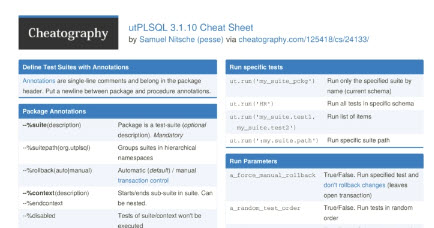Today is my birthday and to celebrate it I want to give something to the utPLSQL (and wider PL/SQL development) community:

A new and updated utPLSQL CheatSheet
You can download it directly from here or go to the official Cheatography-page
This goes with a huge “THANK YOU” to the amazing people in the Oracle community. Since I started contributing to utPLSQL, I met a lot of wonderful people, learned a ton and got an amazing lot of help. The utPLSQL project and the people around it had a major impact on my career and personal development during the last 3 years.
A special thanks goes to Jacek Gebal: There would not be a utPLSQL v3 without him and the current framework wouldn’t be in the mature and stable shape it is today.
Thank you Jacek for your fantastic work, for your commitment and the endless stream of effort you donate!